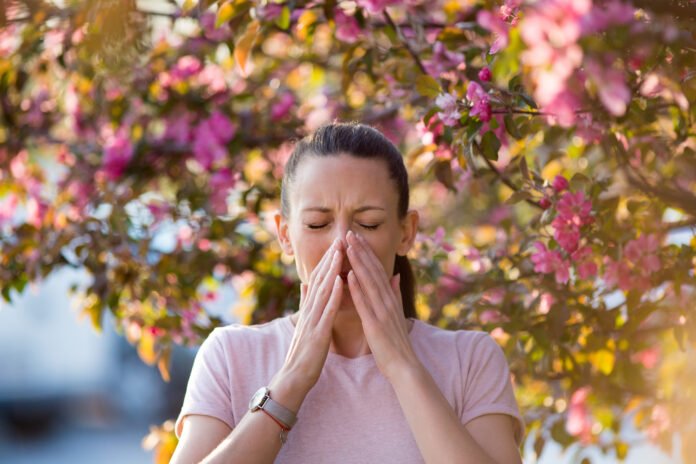Springtime is one of the most beautiful seasons of the year, however, that beauty often comes at the price of seasonal allergies. As trees and flowers go into full bloom, pollen spreads through the air causing an allergic reaction in many people. If you are experiencing the unpleasant symptoms of seasonal allergies and home treatments aren’t working, it may be time to visit your family doctor. A family practitioner has the knowledge and experience to recommend testing, treatments, and a proper diagnosis for those suffering from seasonal allergies. Read on to learn more about seasonal allergies and how a family physician can help.
What Are Seasonal Allergies?
Seasonal allergies, also known as hay fever, happen when pollen from trees, flowers, weeds, or grasses is released into the air and enters your body, resulting in an allergic reaction. The most common time for seasonal allergies is the springtime when trees and flowers go into bloom and pollen is released into the air. Although, some people also experience allergy symptoms during the fall season or even all year long depending upon the triggers of their allergies.
What Are the Symptoms of Seasonal Allergies?
When it comes to seasonal allergies, depending upon how allergic you are to a particular pollen, symptoms will vary significantly and may range from mild to severe. Some of the most common symptoms of seasonal allergies include sneezing, itchy and watery eyes, post-nasal drip, runny nose, congestion, coughing, and hives/itchy skin. Some people may experience other less common symptoms such as headaches, asthma attacks, wheezing, shortness of breath, allergic reaction, or fatigue. Typically, allergy symptoms are worse in the morning when pollen counts are highest and may lessen throughout the day.
How Can Determine When It Is Time to See a Family Doctor for Seasonal Allergies?
While most people have mild symptoms related to seasonal allergies, that do not require medical treatment, this is not the case for everyone. Thus, if you have been experiencing persistent, disruptive allergy symptoms and home remedies are not providing relief, schedule a visit with your family doctor ASAP. A family doctor can help you to manage your allergies and is trained to recognize any additional problems that may be present due to seasonal allergies, such as asthma or sinus infections.
How Can a Family Practitioner Help?
A family practitioner is well-versed in diagnosing, treating, and managing allergies. Depending upon the severity of your symptoms, he or she may recommend allergy testing to determine the specific allergen(s) that is responsible for your discomfort. Once the allergen(s) is identified, your family doctor can recommend the best treatments to manage your symptoms, so you can get back to living your best life.
What If It Isn’t Seasonal Allergies?
When it comes to seasonal allergies, there are many illnesses that also present with the same symptoms. As such, you may be confused as to whether it is pollen bothering you or if you are dealing with something more serious like Covid-19, the common cold, or even a sinus infection. With such an overlap in symptomology, the only way to know for sure is to see your family doctor. He or she can review your medical history, perform tests, and conduct a physical exam if necessary, so a correct diagnosis can be determined. That way you can receive the right treatment, aiding you in a faster recovery.
How Will a Family Doctor Treat Seasonal Allergies?
Depending on the severity of your allergies and your medical history, a family doctor may suggest a variety of treatment options, including medications such as antihistamines, nasal steroids, decongestants or eye drops/ointments, immunotherapy/allergy shots, herbal supplements, or even acupuncture. Moreover, they may also suggest lifestyle changes that may help reduce the severity of your symptoms, such as avoiding pollen-rich areas, limiting your exposure to the outdoors, running the AC and keeping the windows shut, running an air purifier equipped with a HEPA filter, and/or wearing a pollen mask when outside.
Ultimately, when you choose a family doctor to address problematic seasonal allergies, you can enjoy the peace of mind knowing that you will receive a correct diagnosis and a treatment plan that works. That way you can get back to enjoying life, no matter what the pollen count is like.
Is It Ever Appropriate to Visit an Urgent Care For Seasonal Allergies Instead of a Family Doctor?
In some cases, visiting an urgent care may be an appropriate course of action when it comes to treating seasonal allergies. Urgent care centers can provide quick and efficient diagnosis, even if it is after hours or on the weekend when a traditional doctor’s office would be closed. Urgent care is able to diagnose and treat a variety of conditions, including seasonal allergies. They will also be able to determine whether your symptoms are related to allergies or an illness. Depending on the symptoms you are experiencing, your urgent care provider may prescribe antihistamines, decongestants, or nasal steroids to help reduce symptoms. They may also suggest lifestyle changes, such as staying indoors when the pollen count is high or using an air purifier to reduce allergens. However, if your symptoms are severe or persist, they may refer you back to your primary care doctor who can provide more comprehensive care and determine what triggers are responsible for your allergy symptoms.
Why Should I Visit a Family Doctor for The Treatment of Seasonal Allergies?
When it comes to treating seasonal allergies, there are many great reasons to visit your family doctor. A family doctor can provide all-inclusive care and create a personalized treatment plan that fits your individual needs. They can also assist in the long-term management of your allergies, helping you to identify triggers, so they can be avoided in the future. Additionally, a family doctor is able to provide lifestyle advice and recommendations on ways to reduce your allergy symptoms and improve your overall health. Finally, visiting a family doctor ensures that all of your medical records stay in one place, so they can monitor changes over time and make sure that your allergies do not become worse. Simply put, trusting a family doctor with your seasonal allergies ensures a better outcome for your overall health and well-being.
In conclusion, if you are suffering from the frustrating and often debilitating symptoms of seasonal allergies, don’t just grin and bear it. Instead, make an appointment with your family doctor today for the right diagnosis and treatment plan, so you can get back to life without seasonal allergies standing in the way!
You may also want to read,








